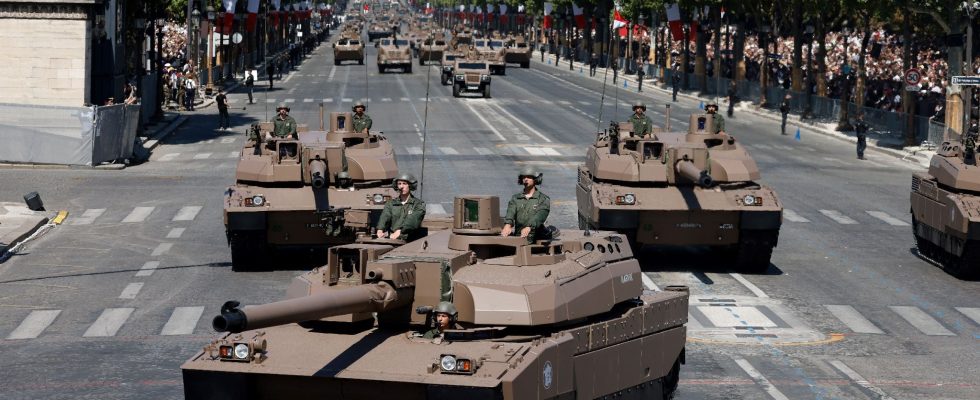Financing social housing and armaments, the combination clashes. This is now the mission of Livret A, since the adoption, at the beginning of November, of an amendment to the 2024 finance bill. These savings can therefore be directed towards SMEs and SMIs of the “defense industrial and technological base “. There is no question, however, of touching the sums managed by the Caisse des Dépôts to support social housing. Only the part managed by private banks – 40% of the approximately 400 billion euros outstanding in the French’s preferred investment – will be available.
Parliamentarians had already tried an approach this summer, via the 2024-2030 military programming bill. Initiative rejected by the Constitutional Council. Why so much effort to support the arms industry? “This firstly reflects the inability of States, today, to finance these investments,” explains Axel Pierron, associate director of Morningstar Sustainalytics. For their part, SMEs in the sector, and to a lesser extent mid-sized companies, for several years have said they are struggling to find funds. “The actors are reluctant because it is an activity which opens the door to controversies, and with a rate of profitability which is not that of fossil fuels,” adds the expert. Fanny Coulomb, economics teacher at Sciences Po Grenoble, observes that “banks are concerned about the lack of transparency of certain contracts, with a risk of legal action, as well as damage to their reputation.” Some establishments also point to pressure from NGOs on the subject.
The constraints that govern the sector further complicate the situation. Slowdowns due to administrative burdens are not viewed favorably by bankers, according to Sylvie Matelly, director of the Jacques Delors Institute. Often, defense start-ups and SMEs operate in both the civil and military sectors. But “the military is very controlled, particularly if it involves innovative technologies. Little by little, these activities are abandoned for the benefit of the civilian sector,” notes the economist.
200,000 direct jobs
However, this sector is strategic for our economy. France exports a lot – 27 billion euros in 2022 – a significant factor given the deficit in our trade balance. The government intends to increase the defense budget to 2% of GDP by 2025, which will require mobilizing our industrial base. Defense represents 200,000 direct jobs and “perhaps as many indirect jobs”, estimates Senator LR Cédric Perrin, chairman of the Committee on Foreign Affairs, Defense and Armed Forces. “There are around 4,000 companies in the defense sector, from very small companies to mid-sized companies, spread across the entire country. Jobs often cannot be relocated,” underlines businessman Serge Weinberg, founder of Weinberg Capital Partners, which recently launched a 100 million euro fund dedicated to these activities.
The banks’ story is very different. “For three years, some parliamentarians have been relaying the idea that banks do not want to finance the defense sector because of ESG risk [NDLR : critères d’investissement tenant compte des enjeux environnementaux, sociaux et de gouvernance]. In practice, this constraint does not exist for the main players in bank financing in France. On the other hand, it may concern capital investors who automatically apply certain labels limiting the defense sector”, we respond to the French Banking Federation. And to recall that the Livret A is already intended to finance SMEs, all SMEs. On the side of the Bank of France, Credit Mediation confirms that “there are no referrals regarding particular difficulties of companies in the defense sector”. While it assures for its part that the obstacles encountered are real, an industry spokesperson acknowledges “that it is difficult to have an objective image of the subject. SMEs are reluctant to report figures on the issue. It’s a somewhat closed sector.”
The war in Ukraine, a turning point
Moscow’s attack on kyiv in February 2022 was a turning point. Former high-ranking Airbus officer Marwan Lahoud, now president of private equity at Tikehau Capital, explains: “In 2019-2020, at the time of the debate on the social taxonomy, Brussels considered excluding the defense of industries.” “Some banks have anticipated this by stopping financing the sector. This debate has been behind us since the war in Ukraine.” The conflict at the gates of Europe has also led some investors to review their requirements, including among so-called sustainable funds. “Thales is often present in portfolios,” notes Axel Pierron. Asset manager Candriam, for its part, has chosen not to support arms manufacturers, even if they are intended to protect populations, arguing that “we cannot ensure that they will not be used , tomorrow, the interests of aggressor countries.
The signage of the A booklet could in any case lead the most cautious banks to change their minds. “There is a signal effect in this measure which can help raise awareness of the determining nature of the sector,” believes Serge Weinberg. Already, an expert reports that a start-up has received proposals from two investment funds in recent days. “The question is: how do we ensure that this positive development is lasting? When the war is over, we must at all costs avoid returning to business as usual“, he pleads.
It remains to be seen how the French will perceive this novelty. Opinion polls in recent years reflect the good image of the army. “Above all, we need a revolution of minds. Let us stop making people believe that it is wrong to finance defense,” according to Senator Cédric Perrin. For Marwan Lahoud, there is no doubt that the French are very willing to “financially support national defense, which contributes to their security”. Patriotic fiber, a new fundraising lever?
